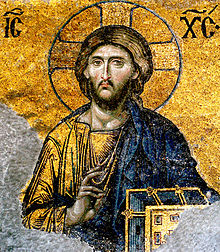by John Ortberg, Senior Pastor, Menlo Park Presbyterian Church
Both President Obama and Governor Romney have had to repeatedly address their views about an itinerant rabbi who lived 2000 years ago.
But why does anyone care?
Yale historian Jeroslav Pelikan wrote, "Regardless of what anyone may personally think or believe about him, Jesus of Nazareth has been the dominant figure in the history of Western Culture for almost 20 centuries. If it were possible, with some sort of super magnet, to pull up out of history every scrap of metal bearing at least a trace of his name, how much would be left?"
It turns out that the life of Jesus is a comet with an exceedingly long tale. Here are some shards of his impact that most often surprise people:
Children
In the ancient world children were routinely left to die of exposure -- particularly if they were the wrong gender (you can guess which was the wrong one); they were often sold into slavery. Jesus' treatment of and teachings about children led to the forbidding of such practices, as well as orphanages and godparents. A Norwegian scholar named Bakke wrote a study of this impact, simply titled: When Children Became People: the Birth of Childhood in Early Christianity.
Education
Love of learning led to monasteries, which became the cradle of academic guilds. Universities such as Cambridge, Oxford, and Harvard all began as Jesus-inspired efforts to love God with all ones' mind. The first legislation to publicly fund education in the colonies was called The Old Deluder Satan Act, under the notion that God does not want any child ignorant. The ancient world loved education but tended to reserve it for the elite; the notion that every child bore God's image helped fuel the move for universal literacy.
Compassion
Jesus had a universal concern for those who suffered that transcended the rules of the ancient world. His compassion for the poor and the sick led to institutions for lepers, the beginning of modern-day hospitals. The Council of Nyssa decreed that wherever a cathedral existed, there must be a hospice, a place of caring for the sick and poor. That's why even today, hospitals have names like "Good Samaritan," "Good Shepherd," or "Saint Anthony." They were the world's first voluntary, charitable institutions.
Humility
The ancient world honored many virtues like courage and wisdom, but not humility. People were generally divided into first class and coach. "Rank must be preserved," said Cicero; each of the original 99 percent was a personis mediocribus. Plutarch wrote a self-help book that might crack best-seller lists in our day: How to Praise Yourself Inoffensively.
Jesus' life as a foot-washing servant would eventually lead to the adoption of humility as a widely admired virtue. Historian John Dickson writes, "it is unlikely that any of us would aspire to this virtue were it not for the historical impact of his crucifixion...Our culture remains cruciform long after it stopped being Christian."
Forgiveness
In the ancient world, virtue meant rewarding your friends and punishing your enemies. Conan the Barbarian was actually paraphrasing Ghengis Khan in his famous answer to the question "what is best in life?" -- To crush your enemies, see them driven before you, and hear the lamentations of their women.
An alternative idea came from Galilee: what is best in life is to love your enemies, and see them reconciled to you. Hannah Arendt, the first woman appointed to a full professorship at Princeton, claimed, "the discoverer of the role of forgiveness in the realm of human affairs was Jesus of Nazareth." This may be debatable, but he certainly gave the idea unique publicity.
Humanitarian Reform:
Jesus had a way of championing the excluded that was often downright irritating to those in power. His inclusion of women led to a community to which women flocked in disproportionate numbers. Slaves--up to a third of ancient populations--might wander into a church fellowship and have a slave-owner wash their feet rather than beat them. One ancient text instructed bishops to not interrupt worship to greet a wealthy attender, but to sit on the floor to welcome the poor. The apostle Paul said: "Now there is neither Jew nor Gentile, slave or free, male and female, but all are one in Christ Jesus." Thomas Cahill wrote that this was the first statement of egalitarianism in human literature.
Perhaps as remarkable as anything else is Jesus' ability to withstand the failings of his followers, who from the beginning probably got in his way at least as much as they helped. The number of groups claiming to be 'for' Jesus are inexhaustible; to name a few: Jews for Jesus, Muslims for Jesus, Ex-Masons for Jesus, Road Riders for Jesus, Cowboys for Jesus, even Atheists for Jesus.
The one predictable element of this fall's U.S. presidential campaign is that it will be called "the most important election of our time." As the last one was called, and the next one will be.
Meanwhile, the unpredictable influence of an unelected carpenter continues to endure and spread across the world
A GOOD MUSLIM IS A BAD MUSLIM - A DEBATE AT THOMAS MORE COLLEGE








No comments:
Post a Comment